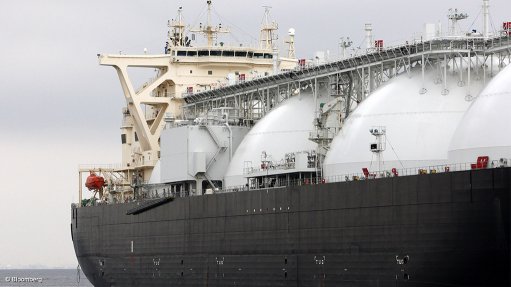
Photo by: Bloomberg
VANCOUVER (miningweekly.com) – The Pacific NorthWest liquefied natural gas (PNW LNG) project has been cancelled by its shareholders, following an in-depth review and changed market conditions.
Malaysia-based Petronas, the majority shareholder of the project, made the announcement on Tuesday, leaving the project, which has a total calculated capital price tag of about C$36-billion, dead in the water.
The PNW LNG project received federal approval in September last year and would have shipped LNG from Port Edward, British Columbia, to new markets across the Pacific in Asia and elsewhere. However, LNG prices took a tumble of more than 85% over the past six years, dropping from around $20 per million British thermal units (mBtu) in 2011, when the project was first conceived, to about $3/mBtu today.
“We are disappointed that the extremely challenging environment brought about by the prolonged depressed prices and shifts in the energy industry have led us to this decision,” stated PNW LNG chairperson Anuar Taib on Tuesday.
“Petronas and its North Montney joint venture partners remain committed to developing their significant natural gas assets in Canada and will continue to explore all options as part of its long-term investment strategy moving forward,” added Taib.
With a total capital investment of up to C$36-billion – when accounting for upstream natural gas development – the project represented one of Canada's largest resource development projects. During construction, the project would have created about 4 500 jobs and a further 630 direct and indirect jobs during the operation of the facility. As well as benefiting from job creation throughout the region, local First Nations communities will now be left without the benefit agreements reached with the proponent.
The Pacific NorthWest LNG facility would have been located on Lelu Island. The proposed project would have converted natural gas to LNG for export to Pacific Rim markets in Asia. At full build-out capacity, the facility would have been able to receive about three-billion cubic feet a day of pipeline-grade natural gas and would have produced up to 18-million tonnes a year of LNG.
LNG is natural gas that is cooled to about -162 ˚C, where it becomes a liquid and can be stored at atmospheric pressure. Once delivered to markets by specially designed LNG carriers, the LNG will be returned to a gaseous state and sent through pipelines for residential, commercial and industrial use.